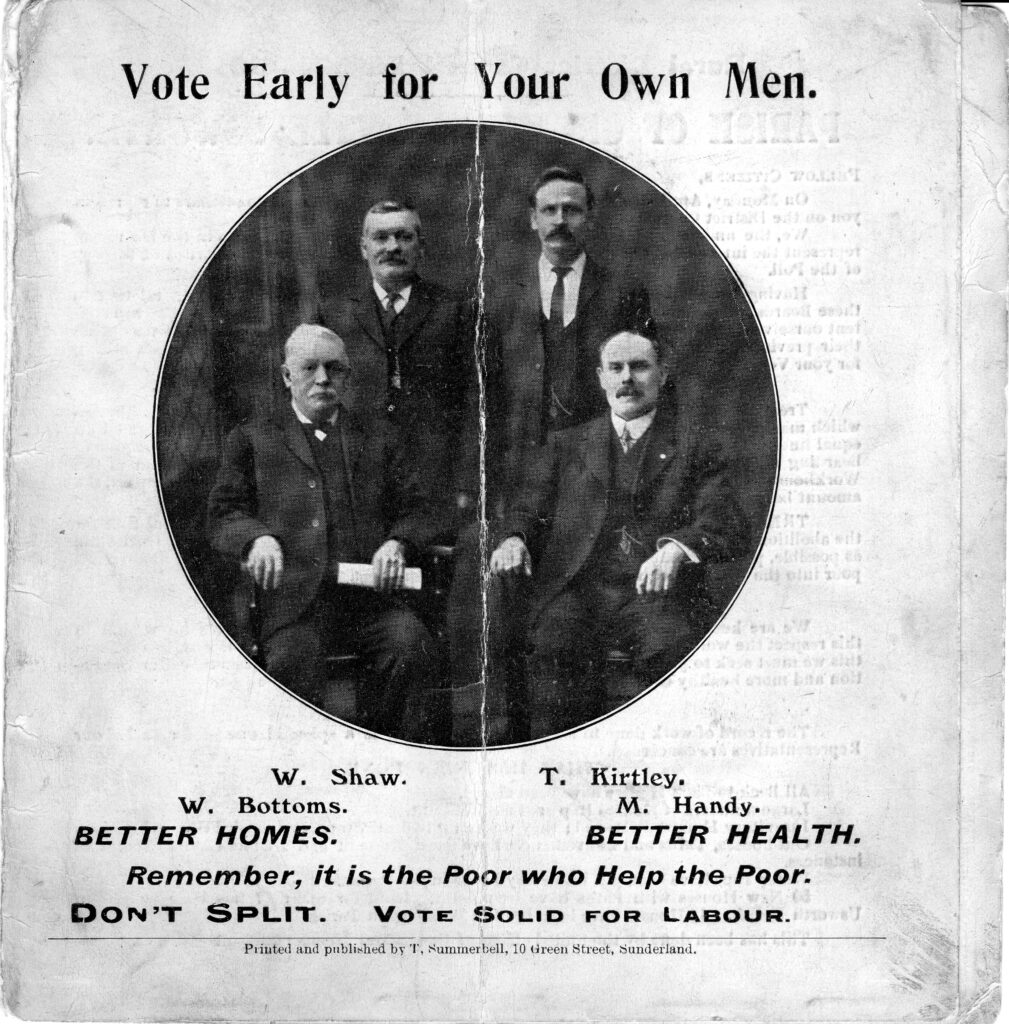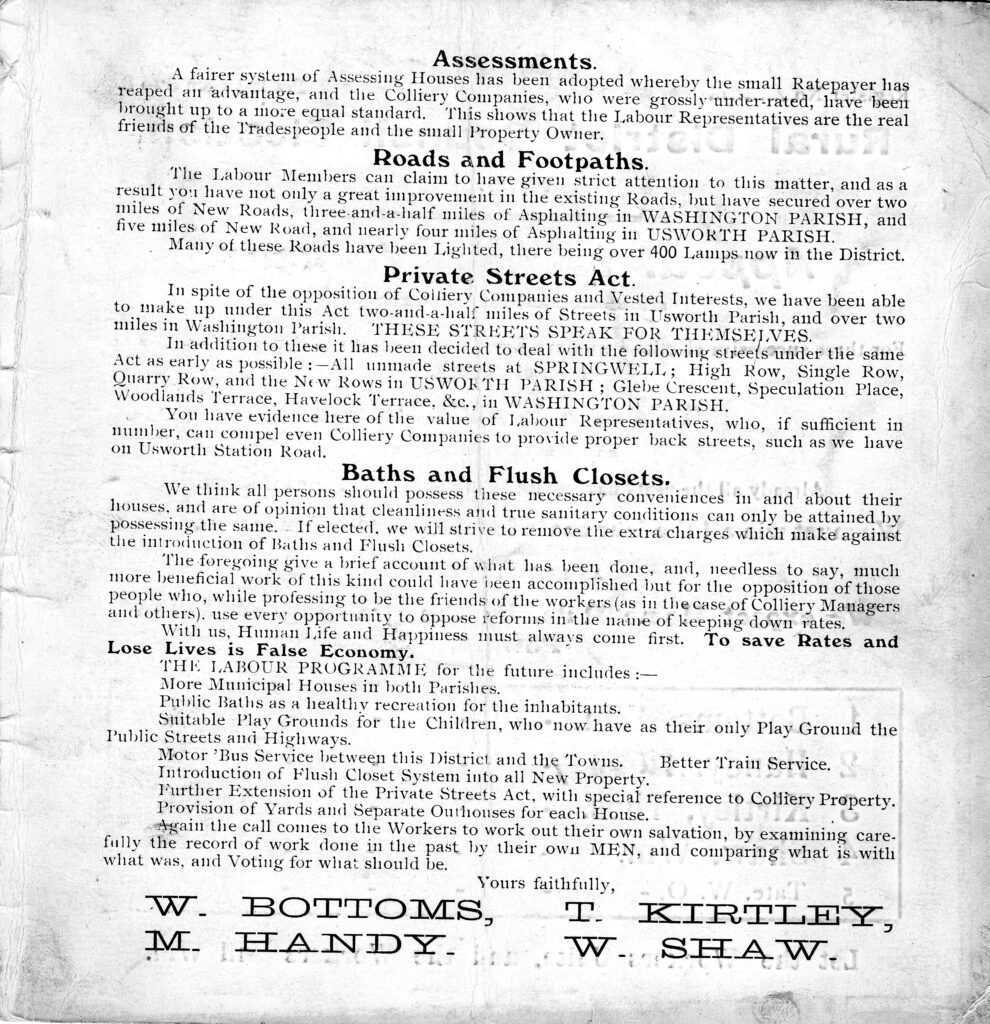By John Pickard
This week sees the 136th Durham Miners’ Gala, which is a celebration of the proud traditions of the Durham Miners Association and other trade unions in the area. It is a time to reflect on all the reforms often taken for granted today, like overtime pay, paid holidays, weekends off, sick pay, maternity pay, safety at work, and many more benefits, that have only been achieved by the struggles of trade unions in the past. None of these things were given gratis.
It is also a time to reflect on the political struggle of miners and their communities in Durham, where the political wing of the movement fought for material and meaningful improvements in the lives of ordinary working-class people, against the opposition of landowners, colliery owners and the wealthy in general.
Left Horizons is grateful to Steve Black, of Annfield Plain Labour Party, who sent us scans of a Labour brochure from 1913, where his great-grandfather, Thomas Kirtley, was one of four Labour candidates for the Rural District Council and Board of Guardians in the Parish of Great and Little Usworth. In those days, the working class were fighting for basic things like toilets (even outdoor, but preferably indoor) and running water in homes, for street lighting and public transport and against the culture of the Workhouse.
Even though it was only one parish council election here in Durham, at a time, it should be noted, when only men had a vote, and it could not by necessity deal with national issues, this leaflet from a hundred and nine years ago, shows a Labour Party (Labour Representation) far more radical-sounding that Starmer’s milk and water approach today.
“For three successive elections,” the brochure says, “we have won every seat on the Parish Council and District Council. This is a World Record.”

“Let the Workers Unite”, it says at the bottom of the page, “and the Workers will Win.”
The four signatories to the leaflet were “duly selected” it says, “by the Organised Trades in the District to represent the interests of the Workers…should we be returned.”
The candidates list the achievements they have had whilst they were in office – concrete improvements in the everyday lives of workers and their families and we reproduce the rest of the text of the leaflet here:
- Poor Law Guardian work. Treatment of the Children has been so improved as to abolish that glaring distinction which marked the Workhouse child from other children. They are clothed and educated on equal lines with our own bairns. But whenever possible to do so, we stand for the principle of boarding out the children, where proper homes can be secured, rather than keep them in the Workhouse, and also see that the people who take them not their homes are properly paid, the amount being 4/- [four shillings, or 20p in today’s terms] per quarter for clothes.
- Treatment of the aged poor. As Labour Representatives, we stand first for the abolition of the Workhouse, but until then we will seek to make it as humane an Institution as possible, preferring always to give generous Out-door Relief rather than take our unfortunate poor into the Workhouse, which is but a poor place at best.
- Health Committee’s Work. We are keenly alive to all the needs of the case in this department. We know that in this respect the workers have most at stake. As workers, our only capital is our health, and this we must seek to protect by putting into force the Acts which seek to secure better Sanitation and more healthy conditions of life. This we have tried to do in the past.
- Housing Reform. The record of work done to secure better housing is a splendid one as far as Labour Representatives are concerned.
- WHAT HAS BEEN DONE:
- All back-to-back Houses have been closed.
- Large numbers of Houses Repaired and Re-built
- Insanitary Houses destroyed; they were simply death-traps, and needed destroying.
- Out-houses, Yards and Conveniences have been Re-built and Re-modelled in scores of instances
- Water taps have been put into every house in the Parish.
- 50 New Houses with Baths have been built. Land for another 57 has been bought in Usworth Parish. 42 Houses have been built in Washington Parish.
This has only been done by the united efforts of the Labour members of both Parishes.
- Assessments. A fairer system of Assessing Houses has been adopted whereby the small Ratepayer has reaped an advantage, and the Colliery companies, who were grossly under-rated, have been brought up to a more equal standard. This shows that the Labour Representatives are the real friends of the Tradespeople and the small Property Owner.
- Roads and Footpaths. The Labour members can claim to have given strict attention to this matter, and as a result you have not only a great improvement in the existing Roads, but have secured over two miles of New Roads, three and a half miles of Asphalting in Washington Parish, and five miles of New Road and nearly four miles of Asphalting in Usworth Parish. Many of these roads have been lighted, there being 400 lamps now in the district.
- Private Streets Act. In spite of the opposition of Colliery companies and Vested Interests, we have been able to make up under this Act two and a half miles of Streets in Usworth Parish and over two miles in Washington Parish. THESE STREETS SPEAK FOR THEMSELVES. In addition to these it has been decided to deal with the following streets under the same Act as early as possible: – All unmade streets at SPRINGWELL; High Row, Single Row, Quarry Row, and the New Rows in USWORTH PARISH; Glebe Crescent, Speculation Place, Woodlands Terrace, Havelock Terrace, etc in WASHINGTON PARISH. You have evidence here of the value of Labour Representatives, who, if sufficient in number, can compel even Colliery Companies to provide proper back streets, such as we have on Usworth Station Road.
- Baths and Flush Closets. We think all persons should possess these necessary conveniences in and about their houses, and are of the opinion that cleanliness and true sanitary conditions an only be attained by possessing the same. If elected, we will strive to remove the extra charges which make against the introduction of Baths and Flush Closets.

The foregoing gave a brief account of what has been done, and, needless to say, much more beneficial work of this kind could have been accomplished but for the opposition of those people who, while professing to be the friends of the workers (as in the case of Colliery Managers and others), use every opportunity to oppose reforms in the name of keeping down rates.
With us, Human Life and Happiness must always come first. To save Rates and Lose Lives is False Economy.
The Labour programme for the future includes:-
*More Municipal Houses in both Parishes
*Public baths as a healthy recreation for the inhabitants.
*Suitable Play Grounds for the Children, who now have as their only Play Ground the Public Streets and Highways.
*Motor bus service between this District and the Towns. Better Train Service.
*Introduction of Flush Closet System into all New Property.
*Further Extension of the Private Streets Act, with special reference to Colliery Property.
*Provision of Yards and Separate Outhouses for each House.
Again the call comes to the Workers to work out their own salvation, by examining carefully the record of work done in the past, by their own MEN, and comparing what is with what was, and Voting for what should be.
Yours faithfully,
W Bottoms, T Kirtley, M Handy and W Shaw



